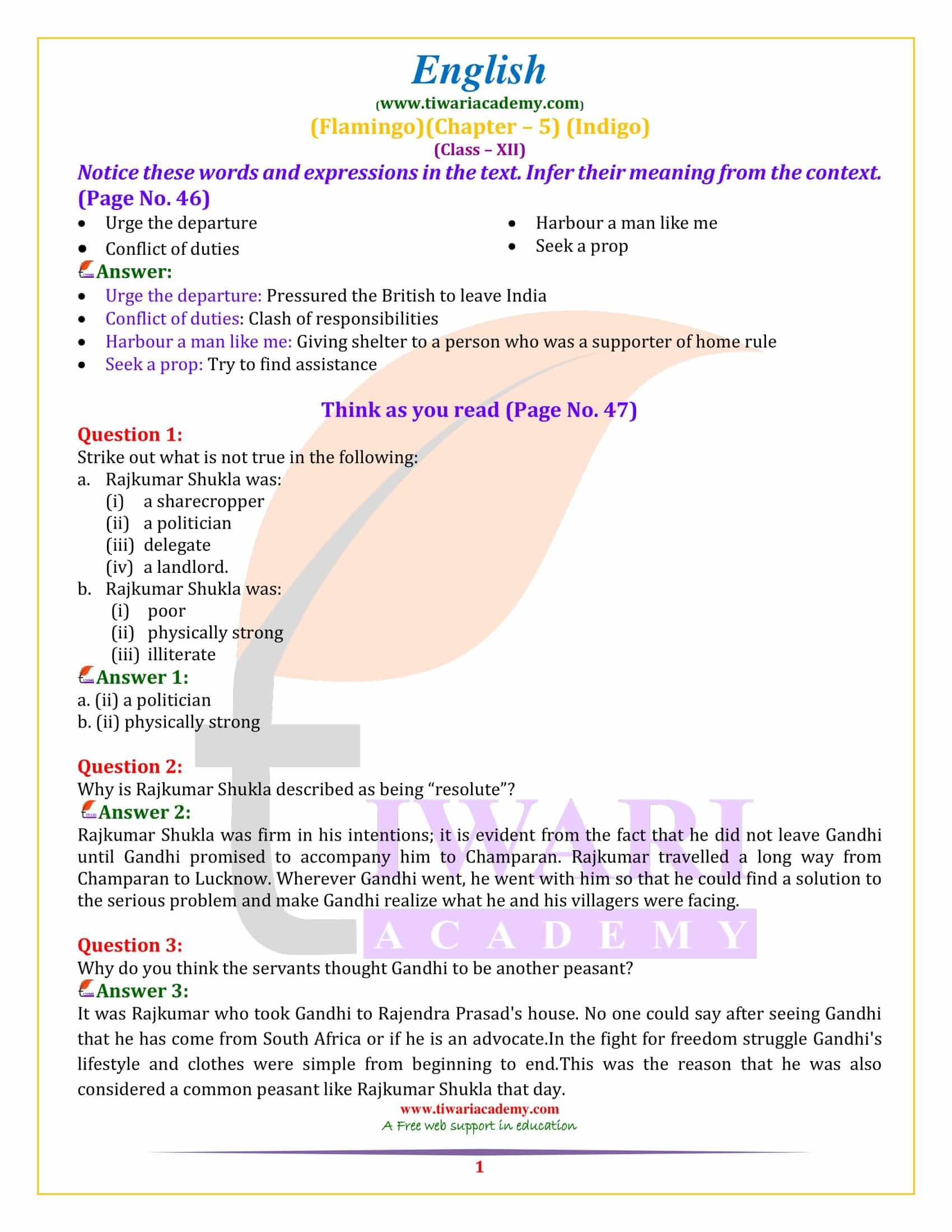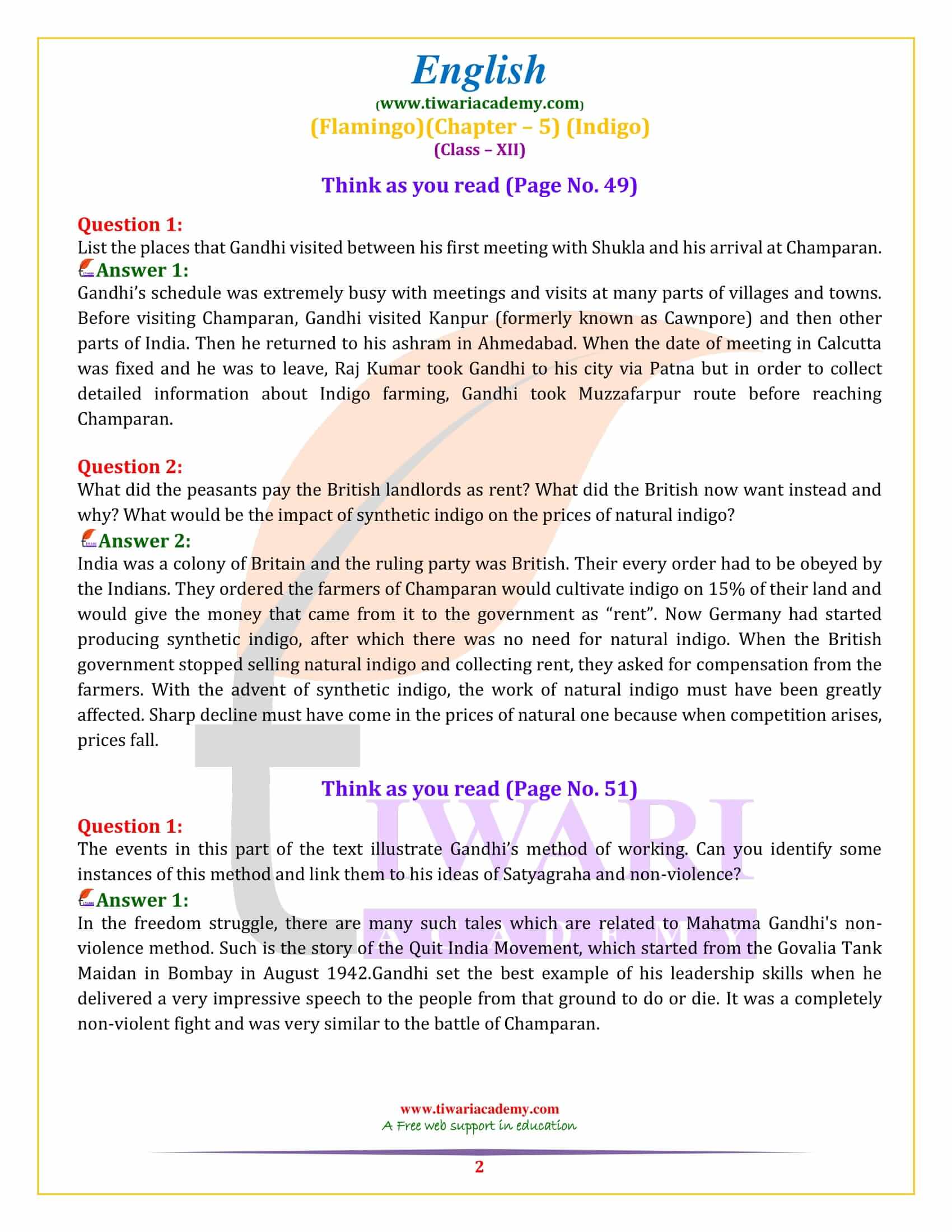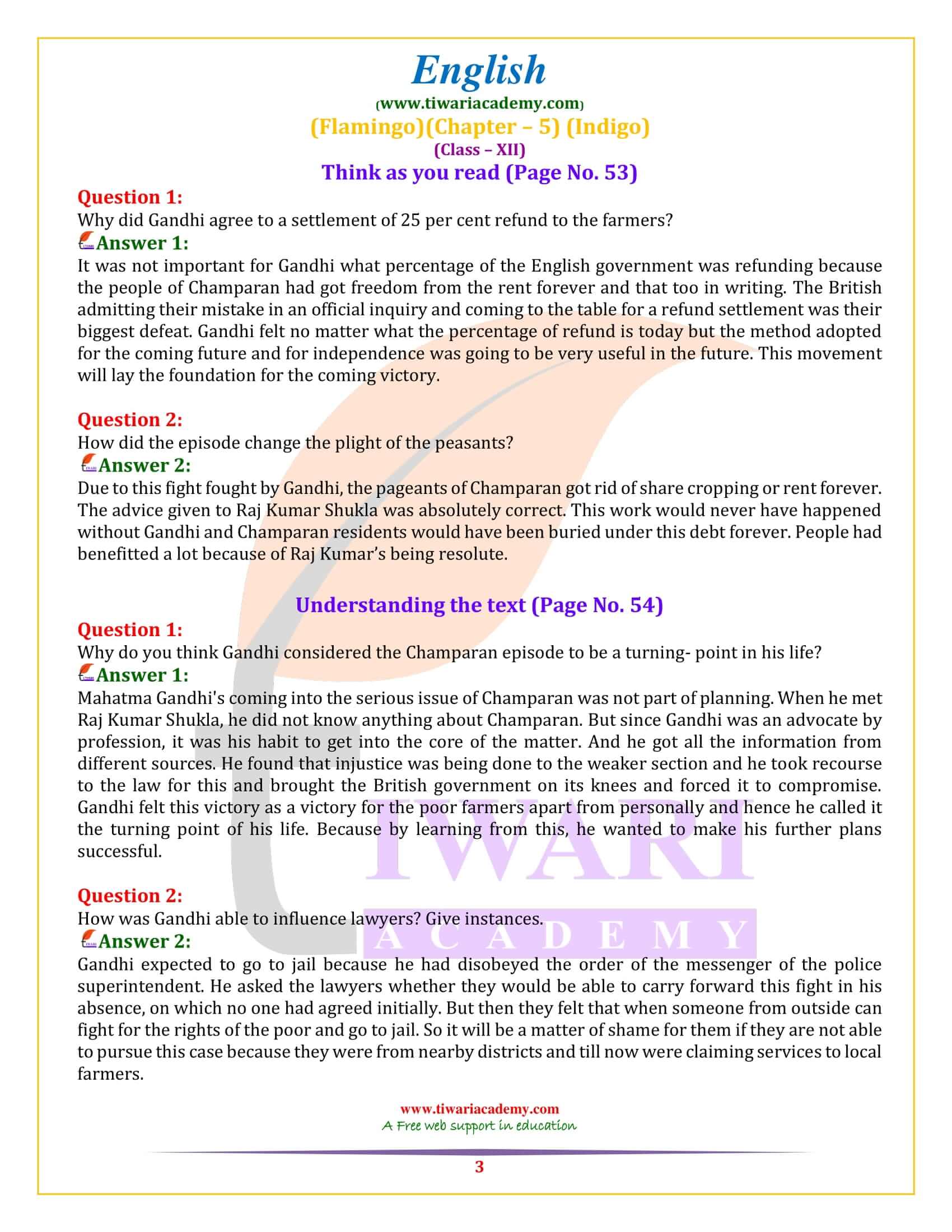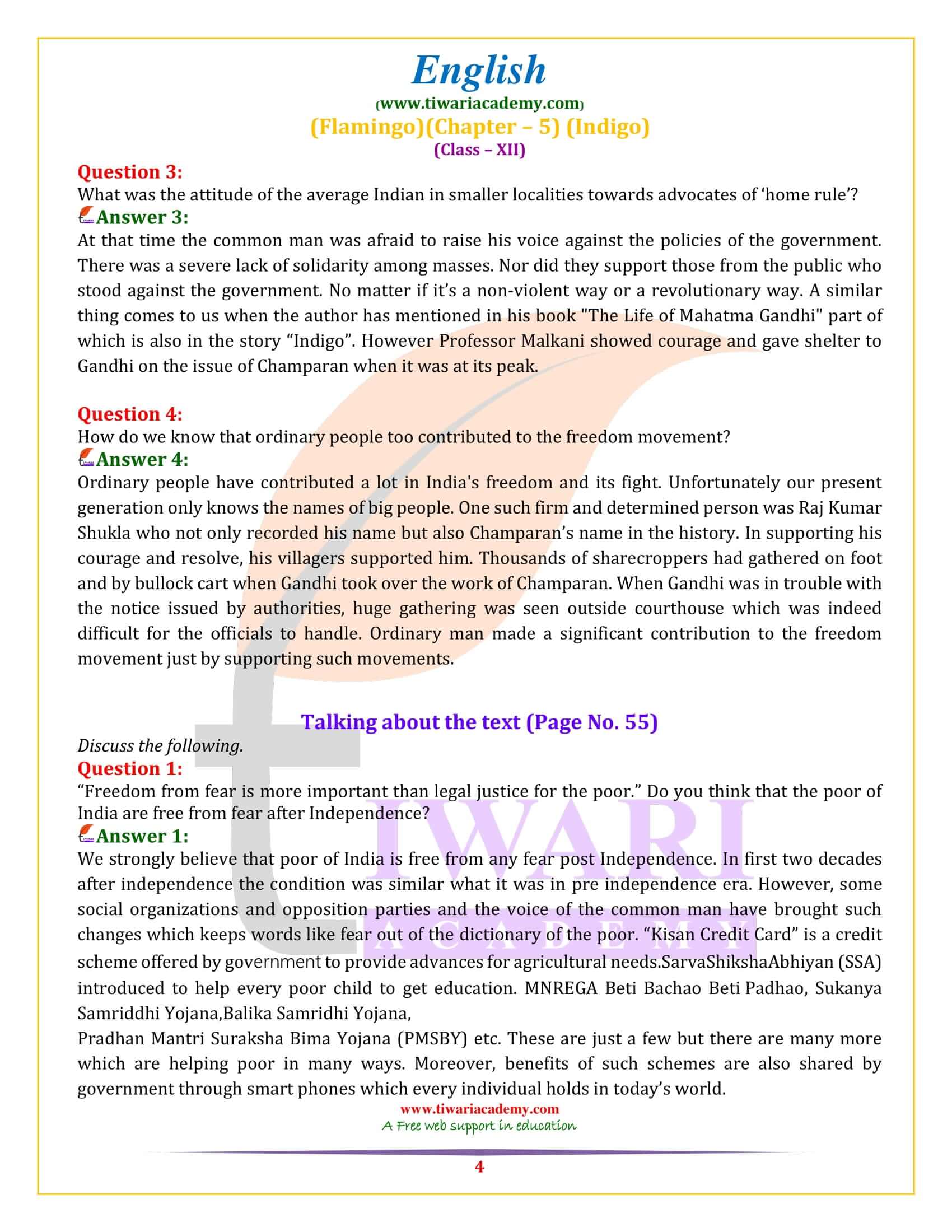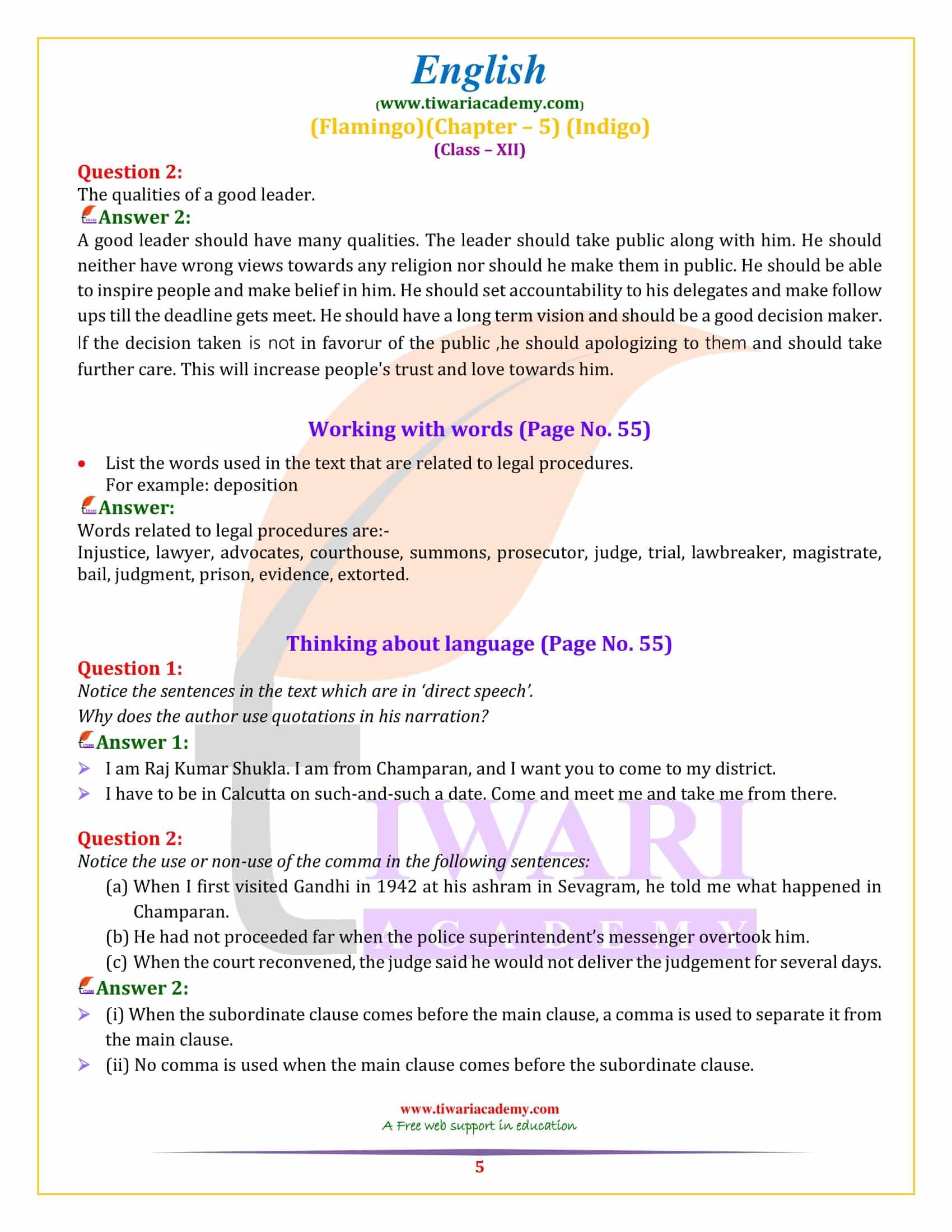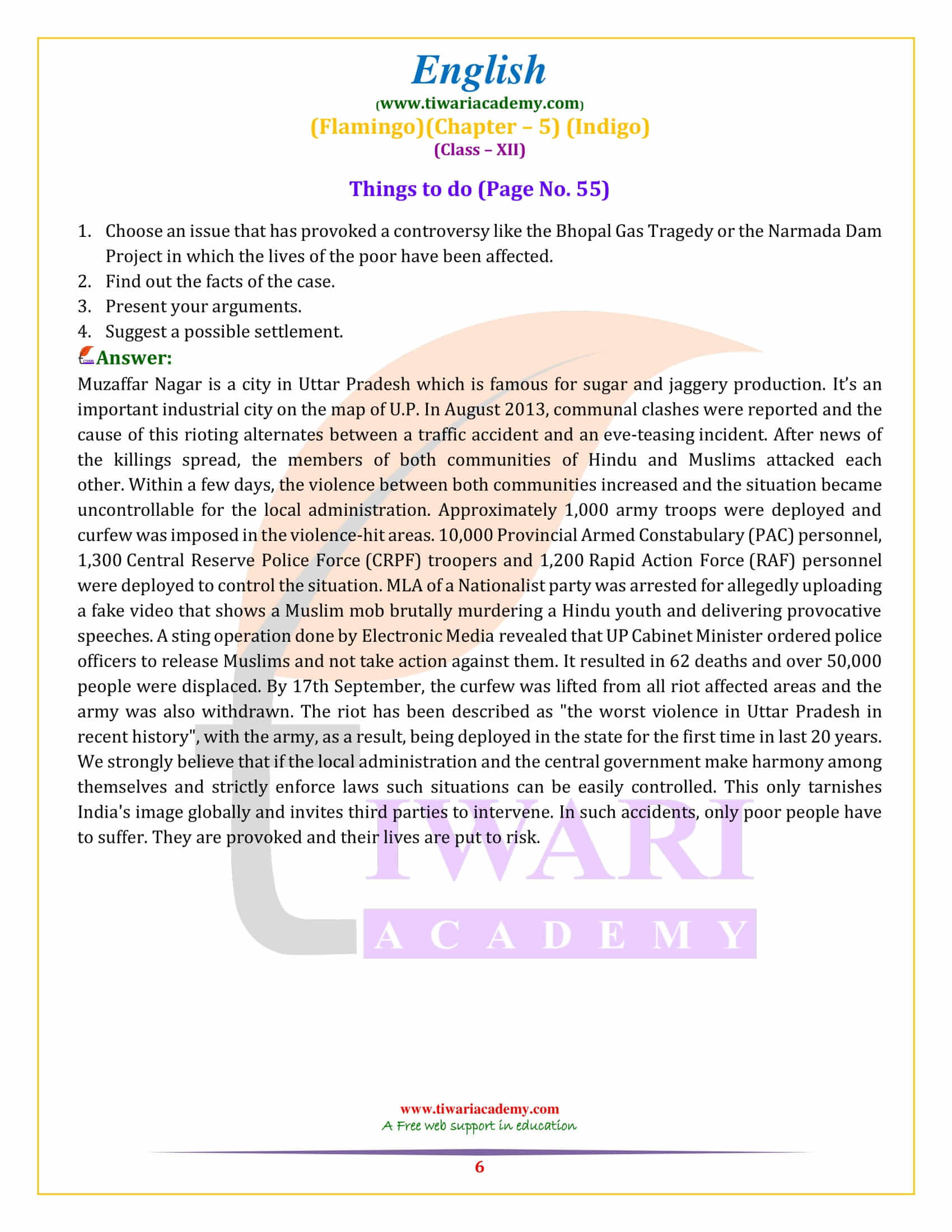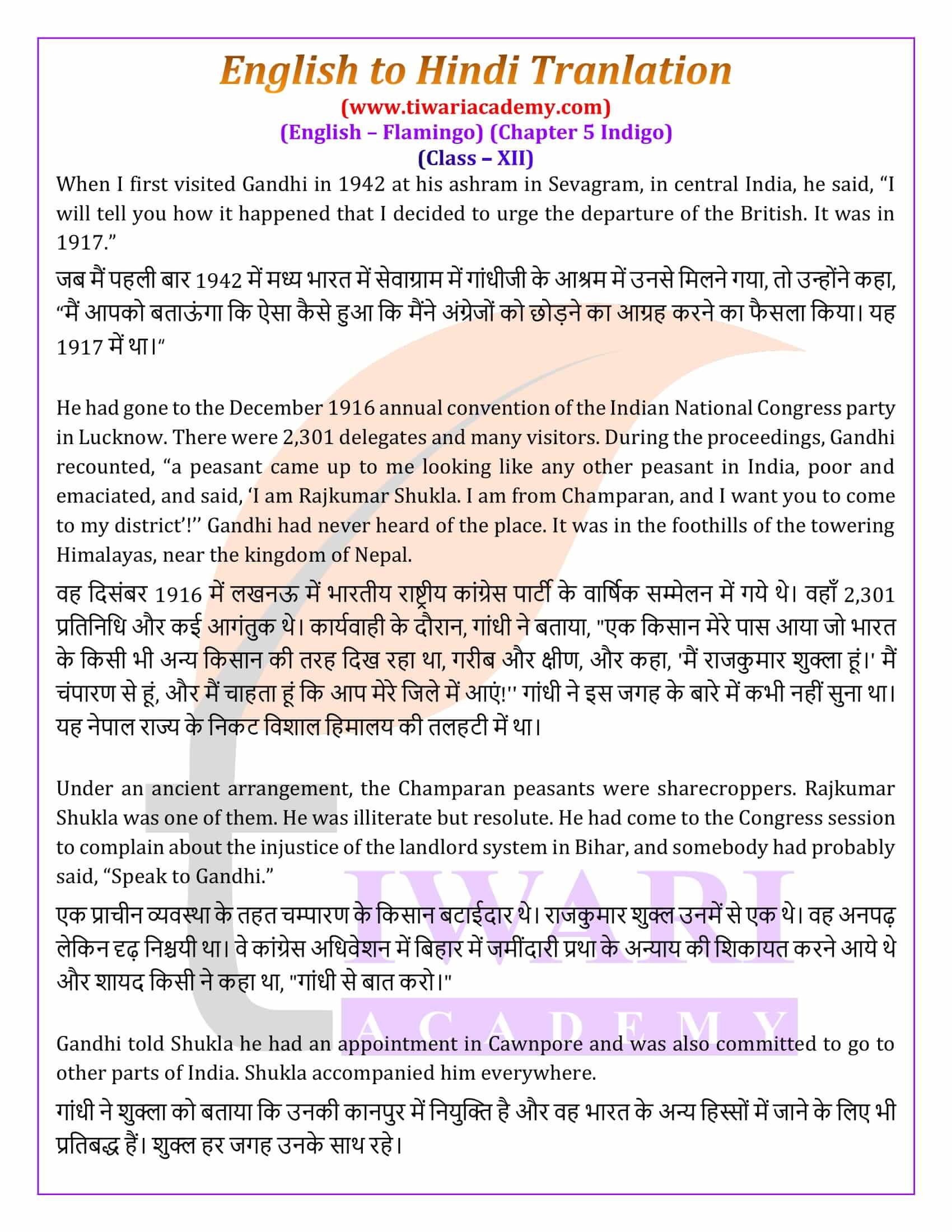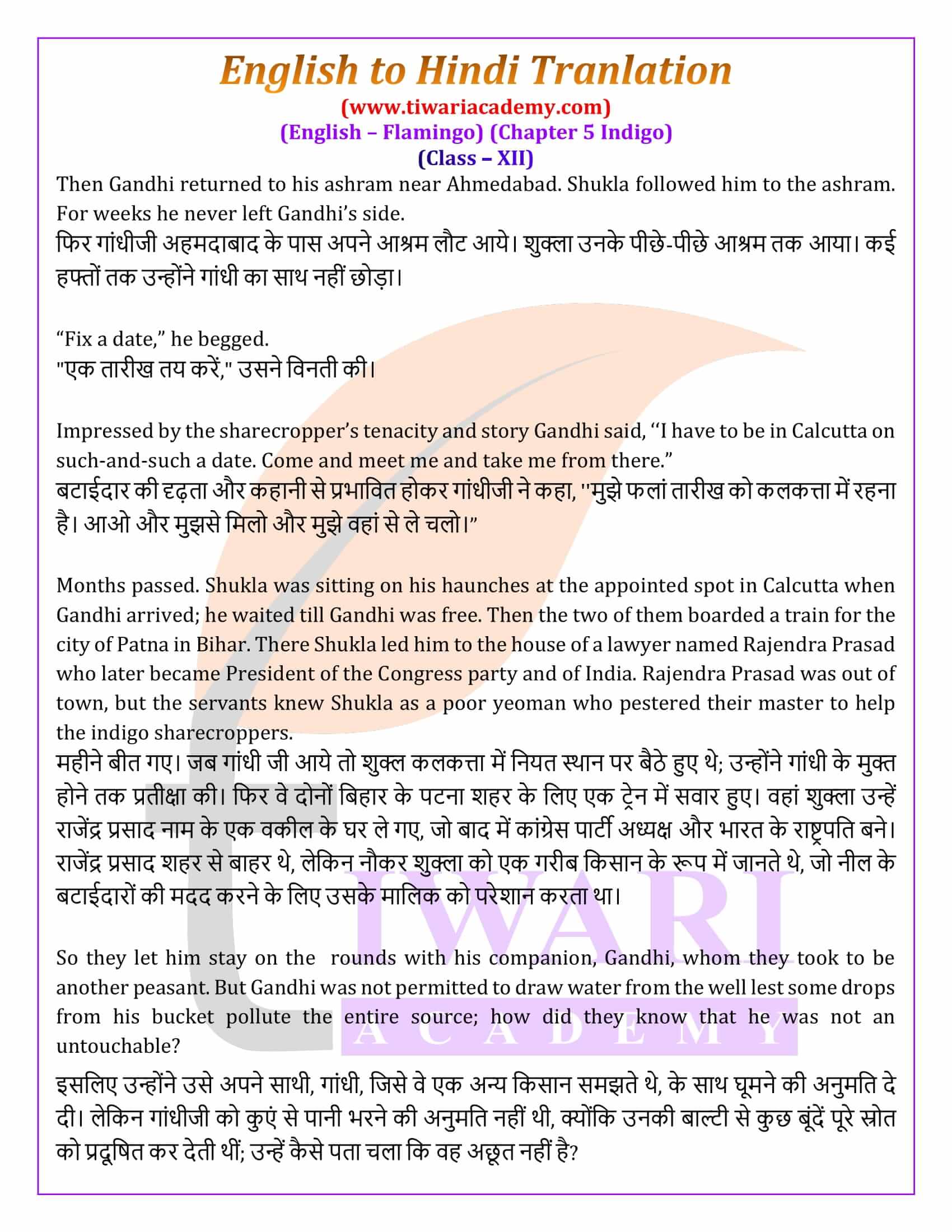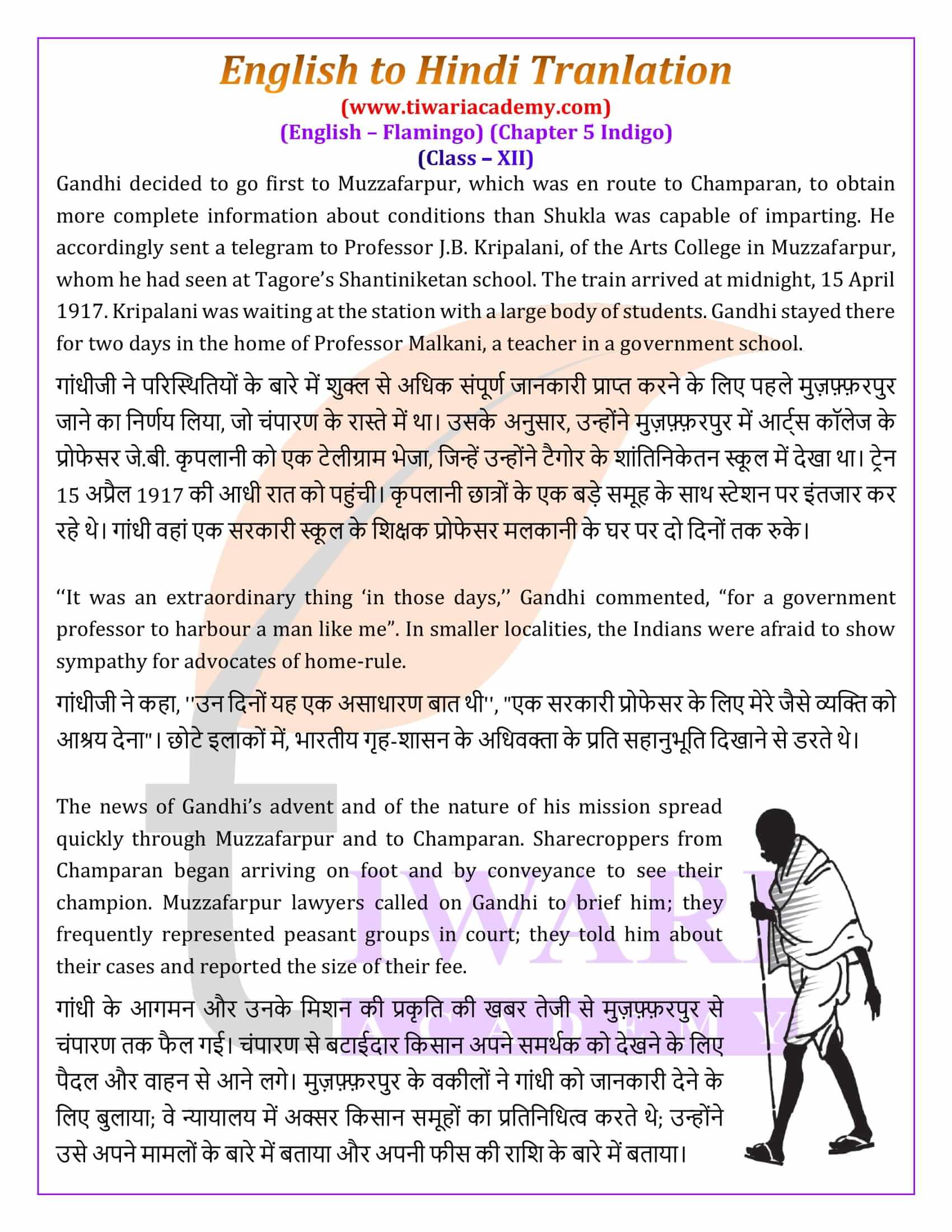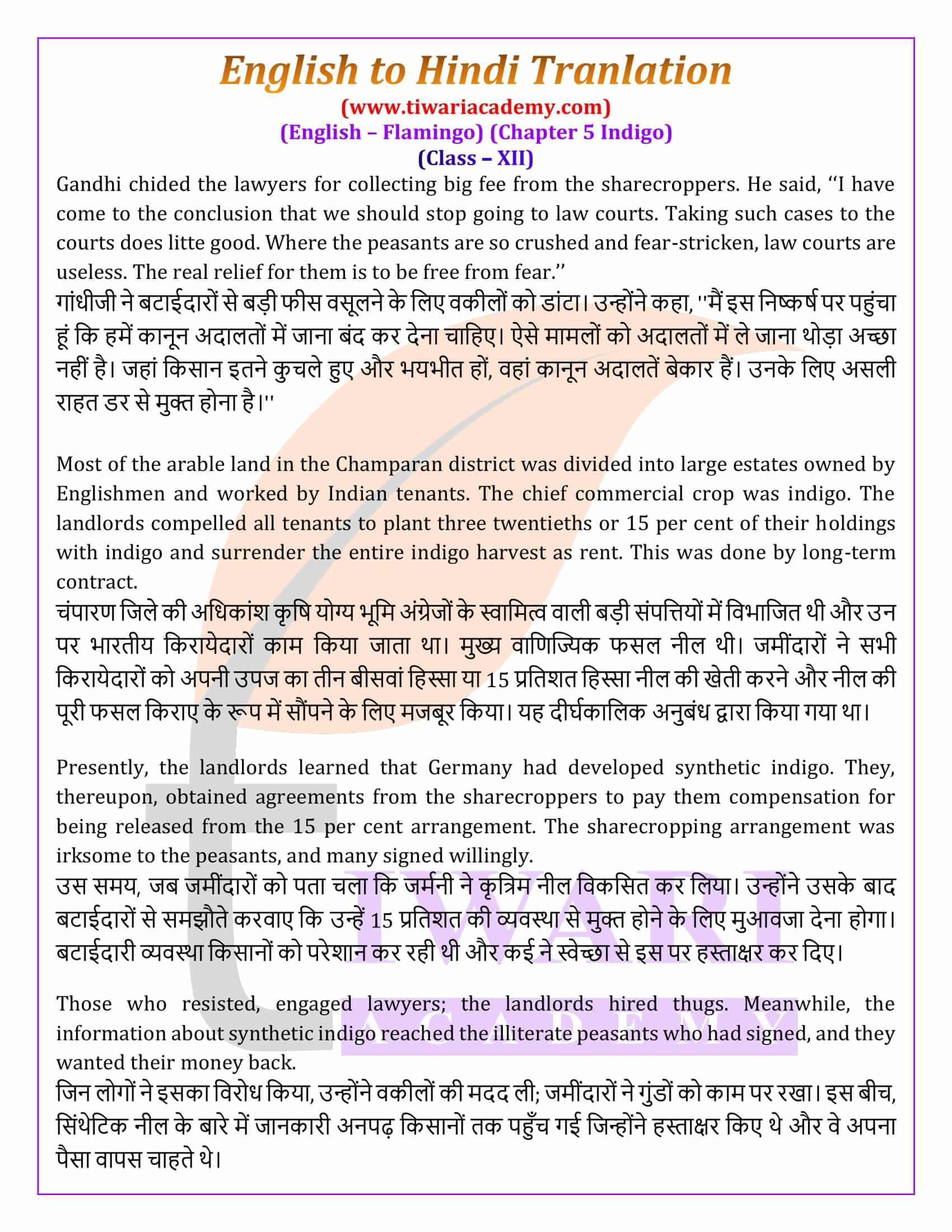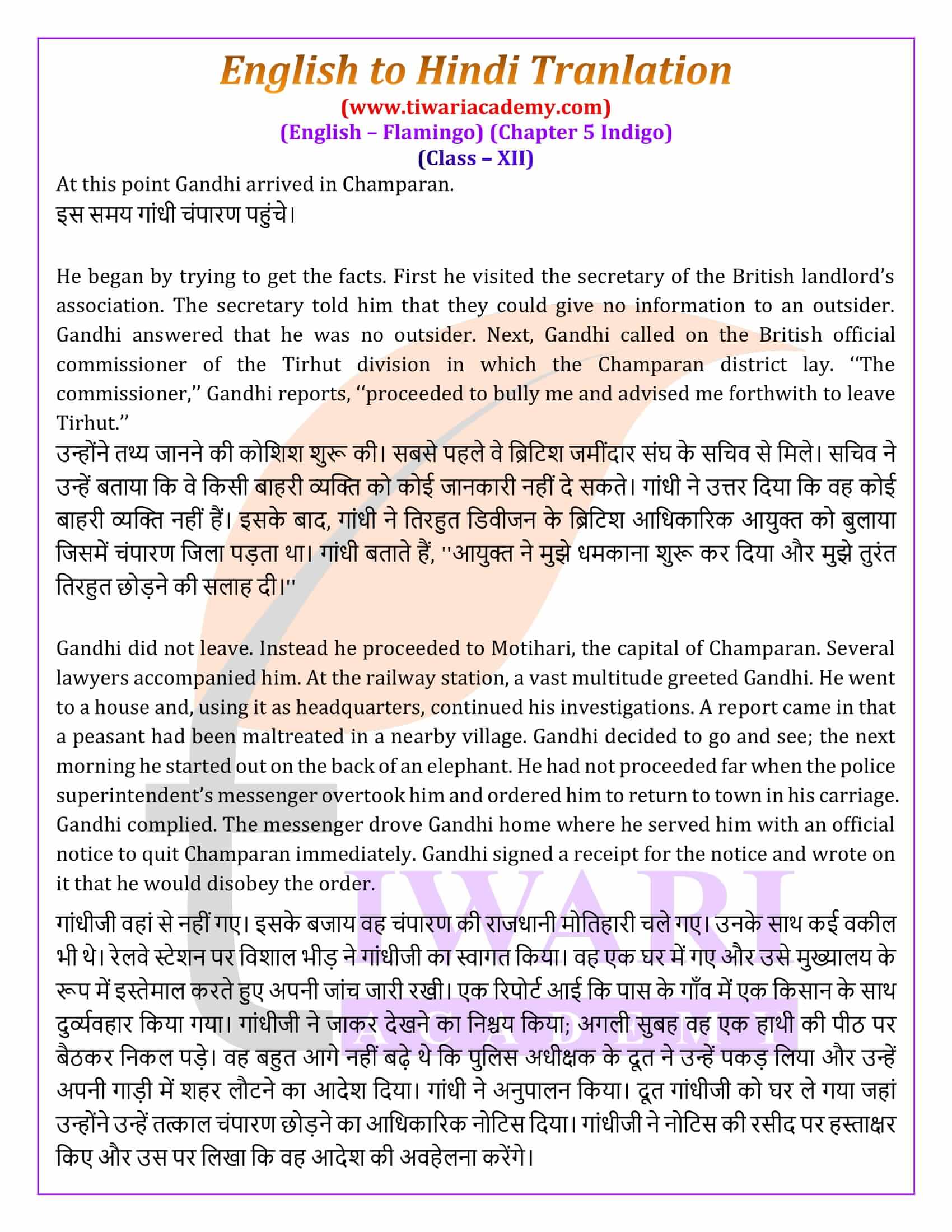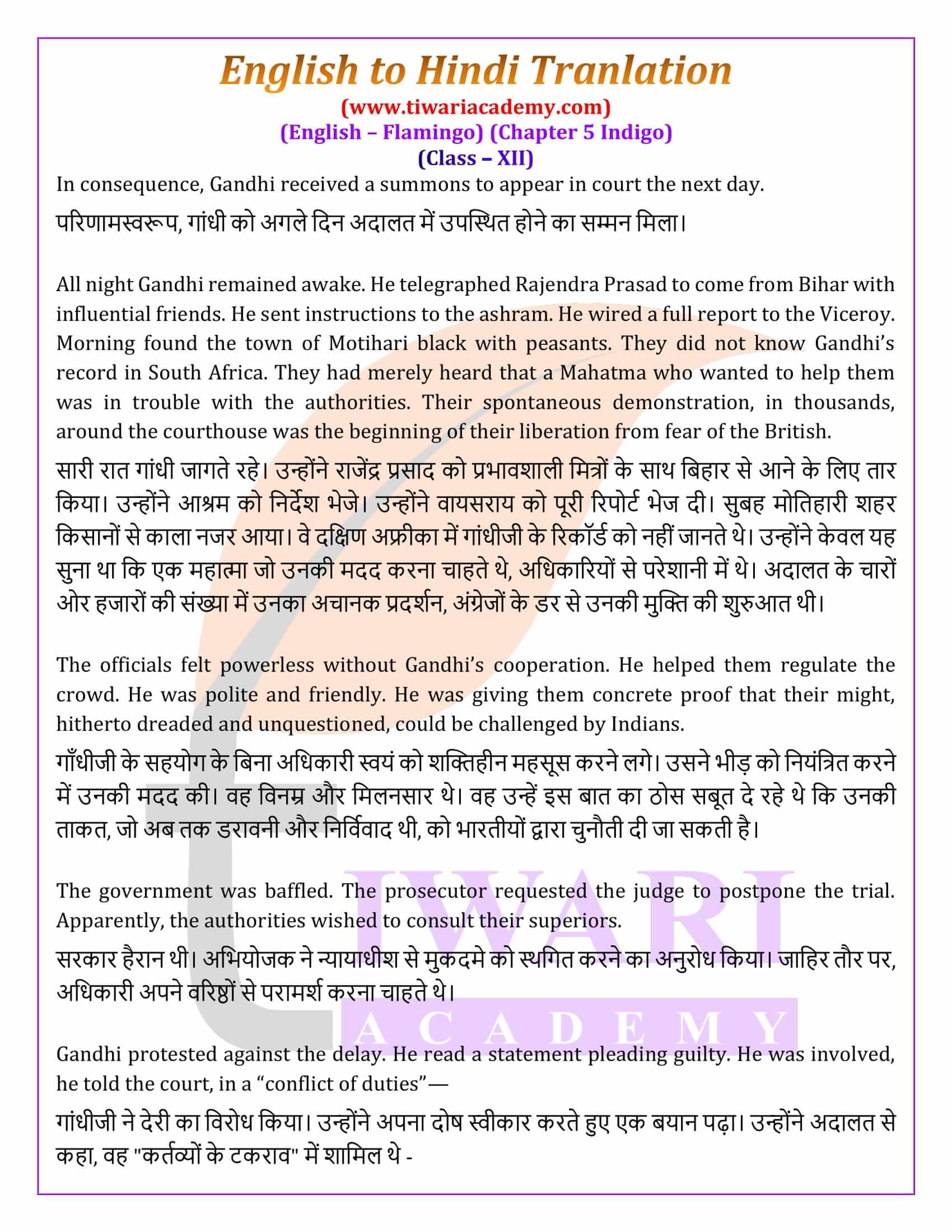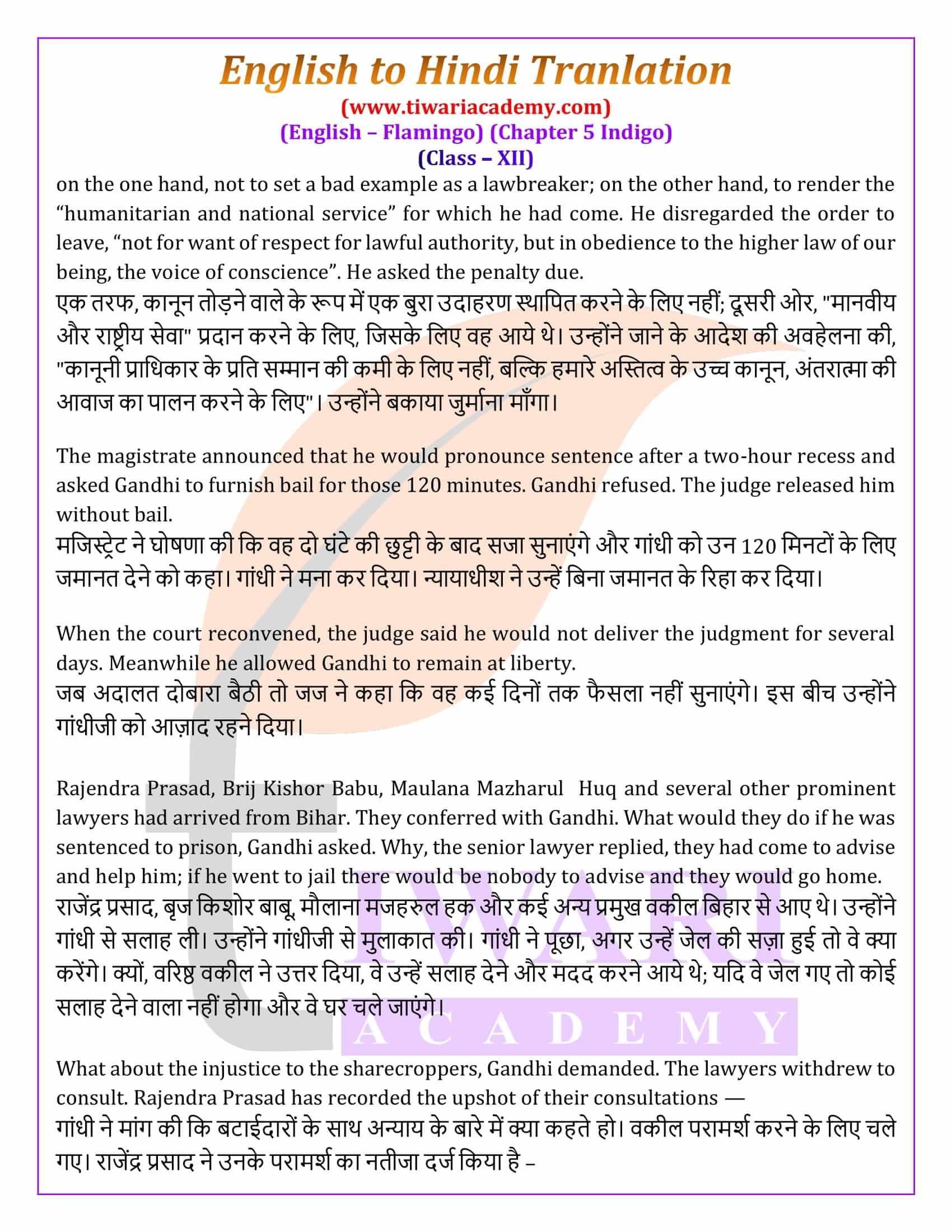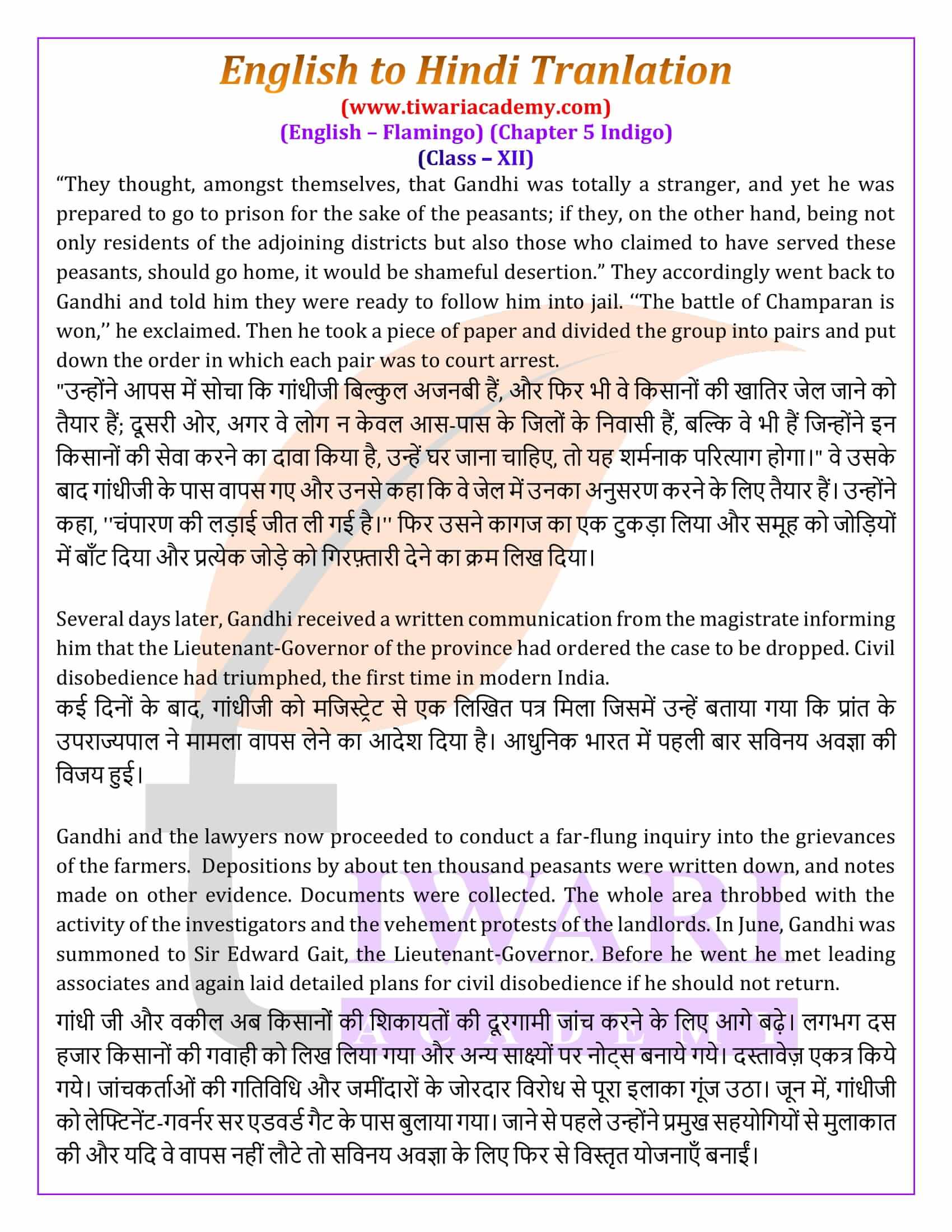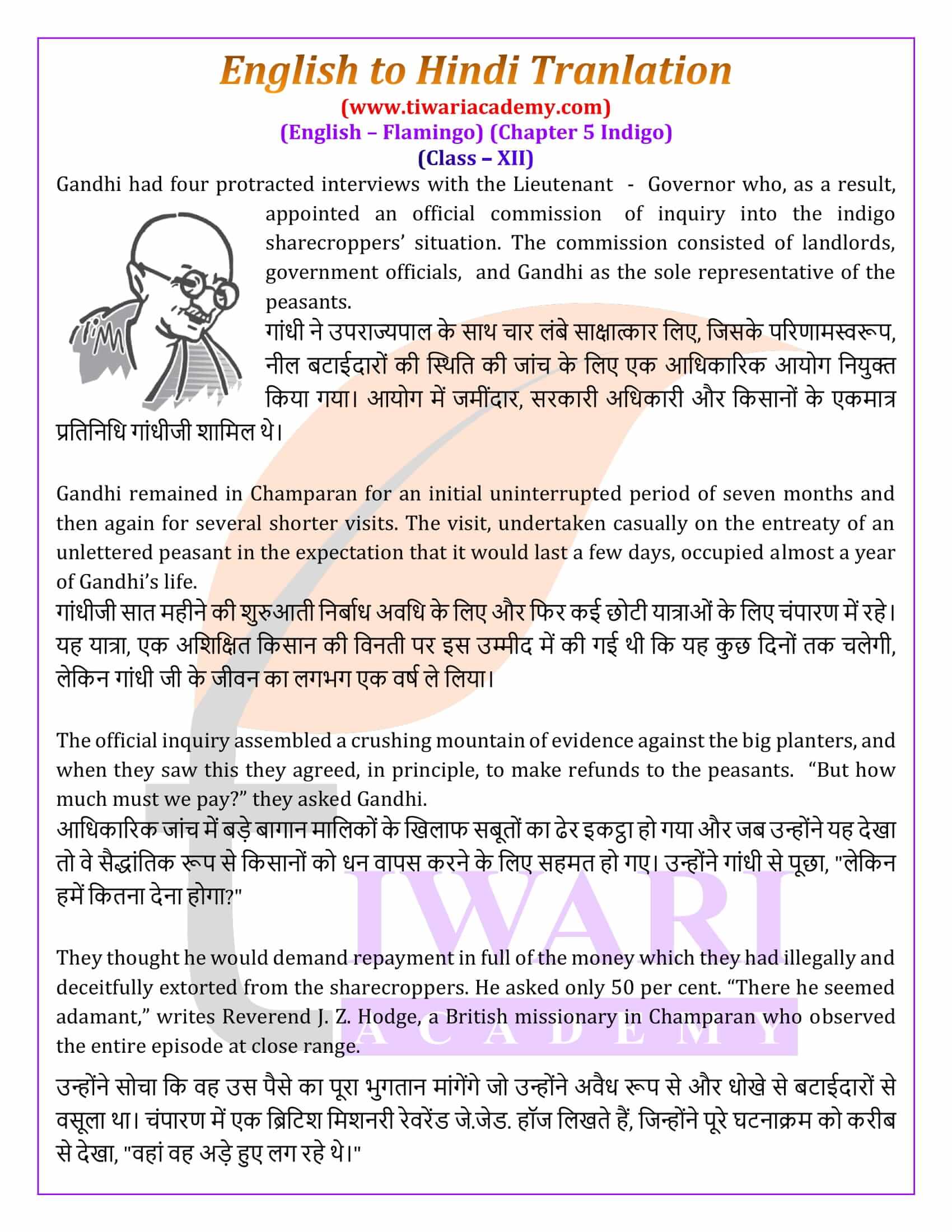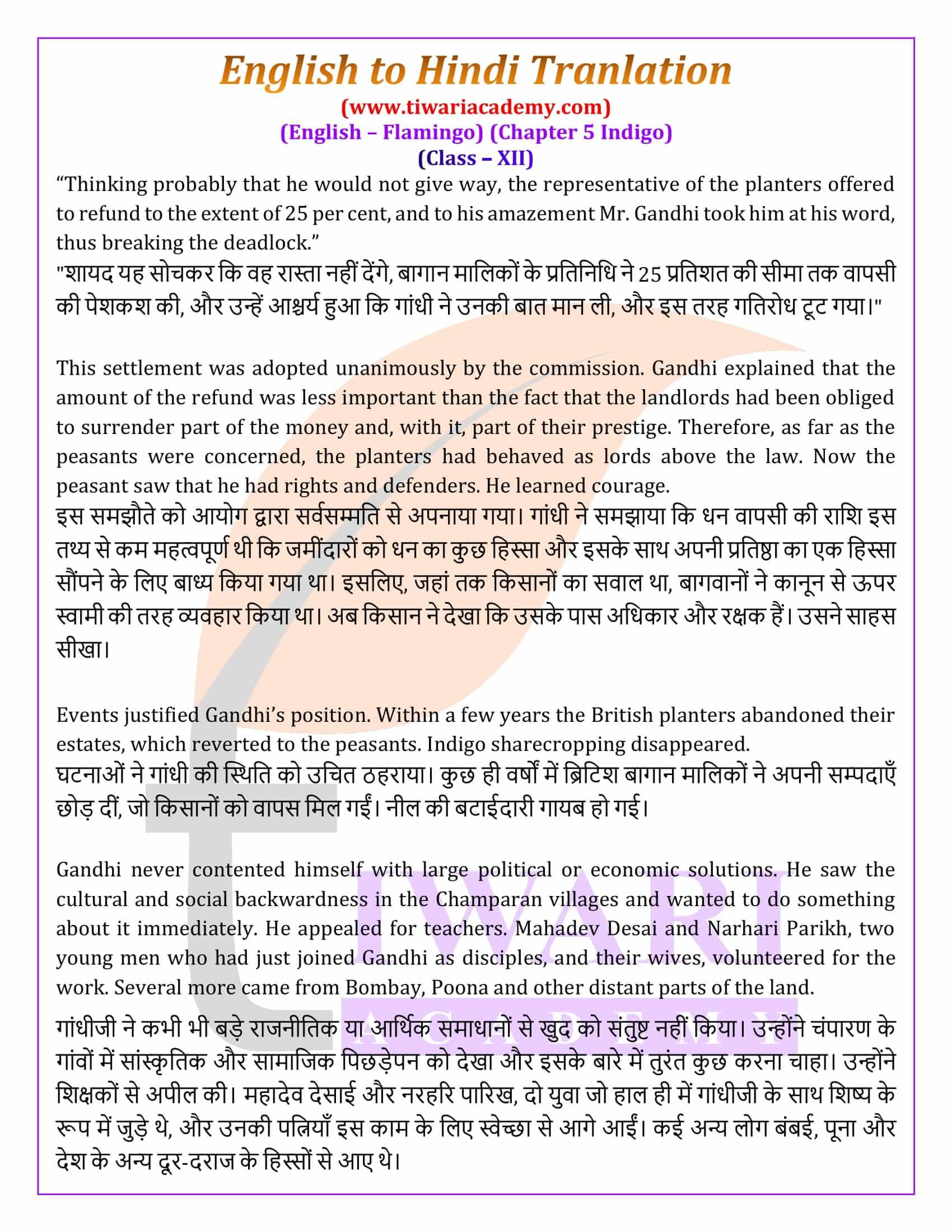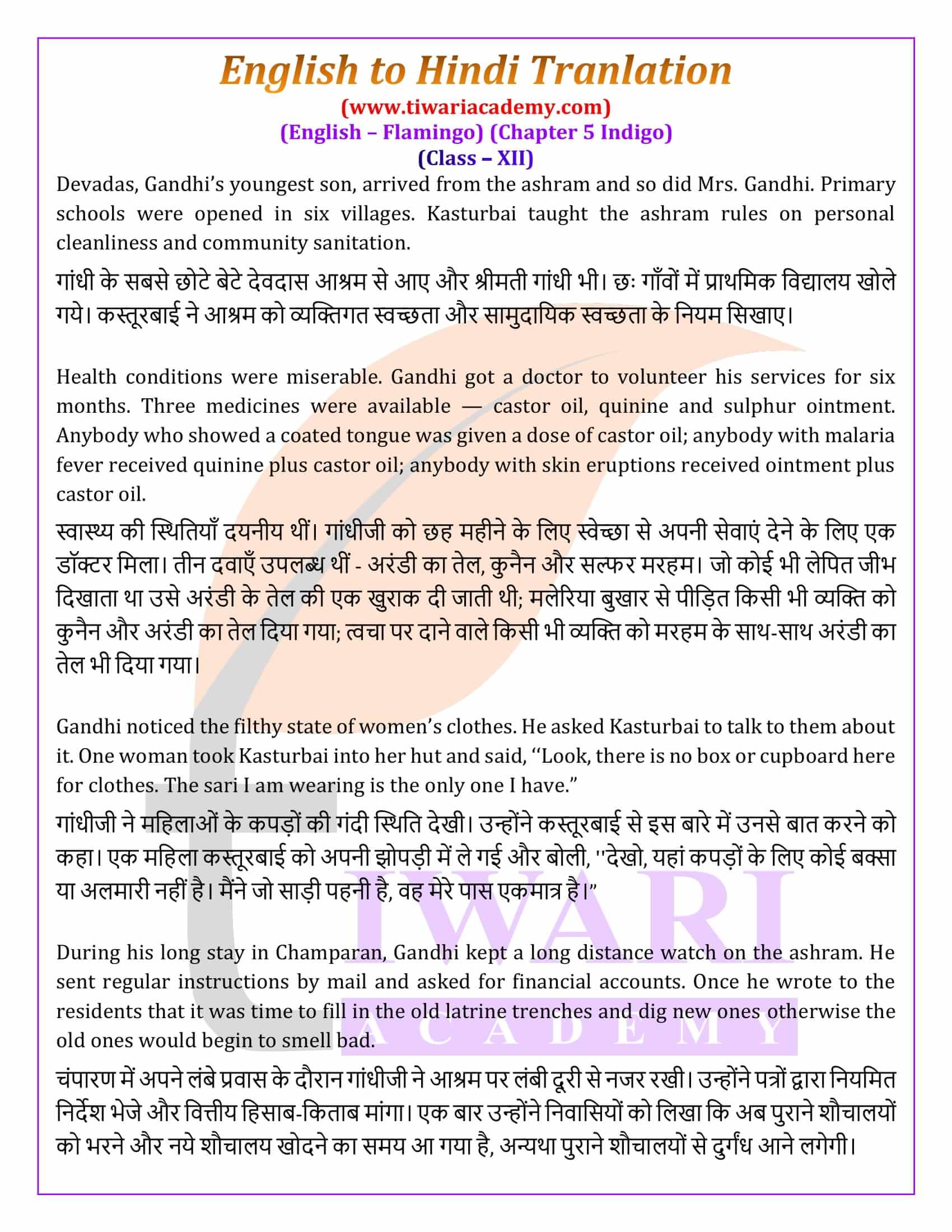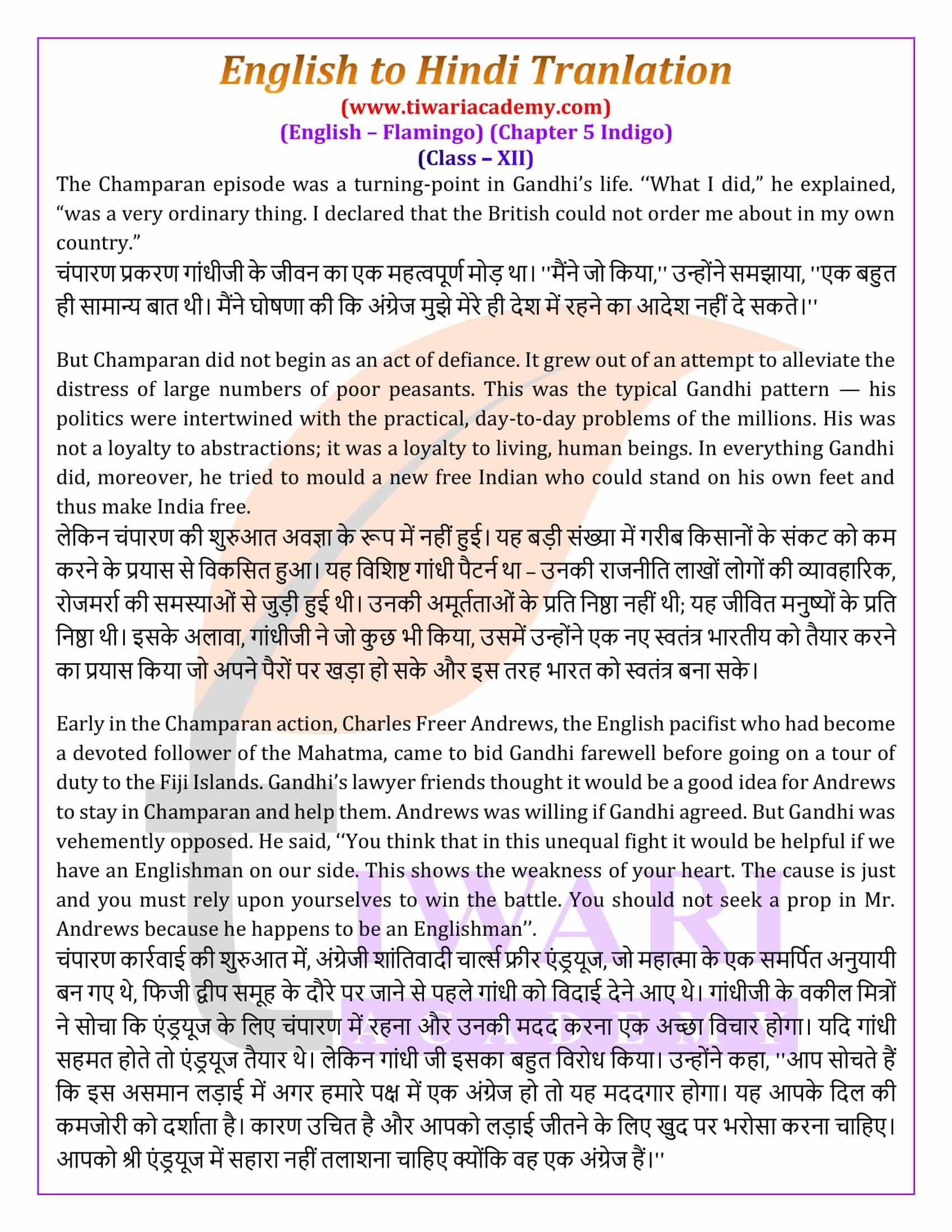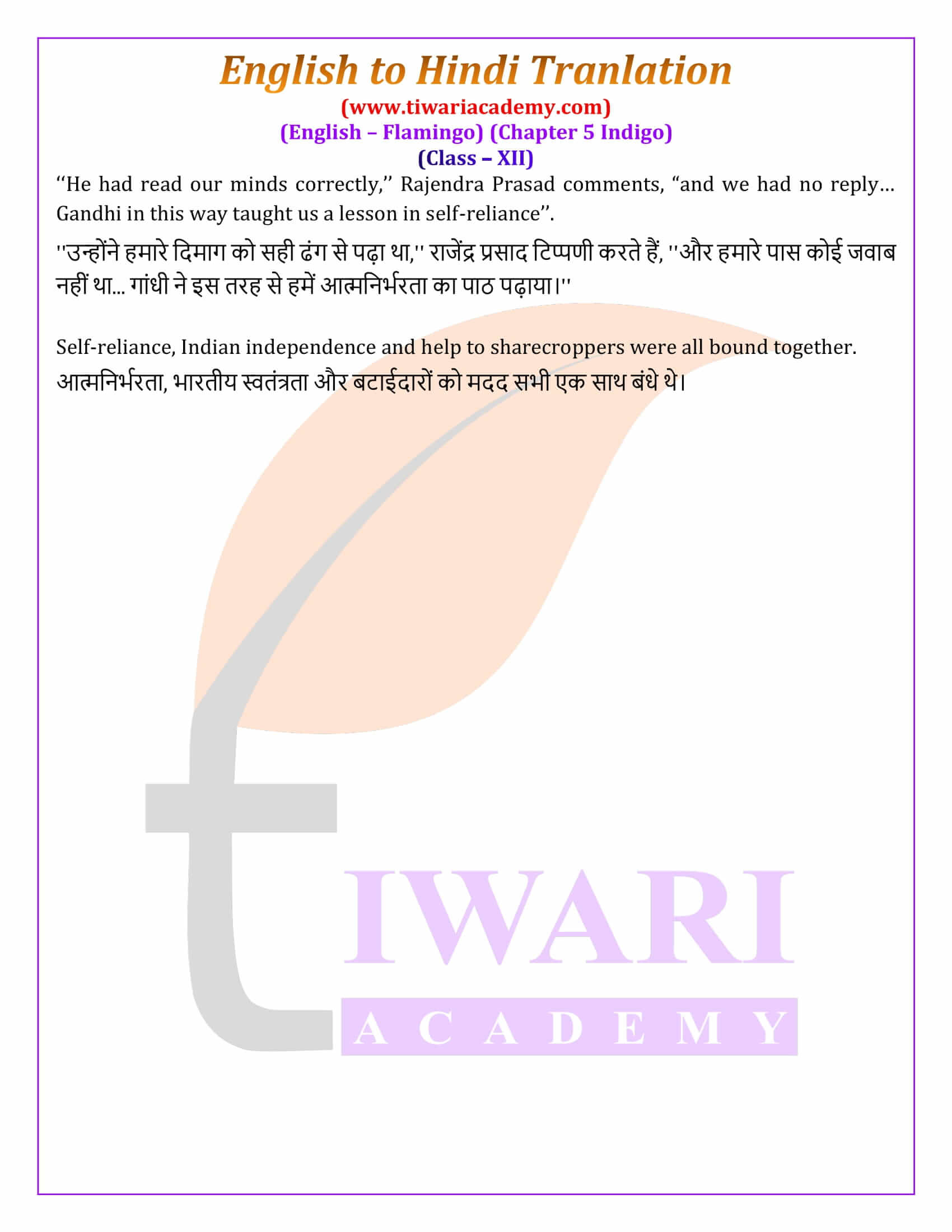NCERT Solutions for Class 12 English Chapter 5 Indigo Flamingo Hindi Translation for the current edition NCERT and prepared for academic year 2025-26. English to Hindi Translation, Extra questions with answers are also given in the category of very short, short and long answer type. These plays an important role in exams.
Class 12 English Chapter 5 Question Answers
Think as you read (Page No. 47)
Why is Rajkumar Shukla described as being “resolute”?
Rajkumar Shukla was firm in his intentions; it is evident from the fact that he did not leave Gandhi until Gandhi promised to accompany him to Champaran. Rajkumar travelled a long way from Champaran to Lucknow. Wherever Gandhi went, he went with him so that he could find a solution to the serious problem and make Gandhi realize what he and his villagers were facing.
a. (ii) a politician
Strike out what is not true in the following: b. Rajkumar Shukla was: (i) poor (ii) physically strong (iii) illiterate
b. (ii) physically strong
Why do you think the servants thought Gandhi to be another peasant?
It was Rajkumar who took Gandhi to Rajendra Prasad’s house. No one could say after seeing Gandhi that he has come from South Africa or if he is an advocate.In the fight for freedom struggle Gandhi’s lifestyle and clothes were simple from beginning to end.This was the reason that he was also considered a common peasant like Rajkumar Shukla that day.
What was the problem of the people of Champaran?
A large fertile part of Champaran came under the British government. Indians used to farm on it. According to an order, Indians were allowed to produce Indigo on 15% of the land and had to pay the income from it as rent to Britishers. And this cycle continued for a long time when one day the news came that Germany has started production of synthetic indigo and the British refused to buy natural indigo from Indians. And instead of paying this rent, the government demanded compensation, against which many landlords started raising their voices. This compensation was too much for small peasants across Champaran as they were already facing many issues with respect to irrigation facilities or lack of modern equipments.
What kind of difficulties did Gandhi face in solving the problem of Champaran?
Gandhi’s experience was very solid in solving such problems. He had solved many such problems alone in South Africa.Because he was a lawyer, so he thought of redressing it through the same means. First he went to Muzaffarpur to seek more information about the Indigo case.He also took help from J. B.Kripalani, Professor of Arts College. Then he consulted lawyers of Muzaffarpur. He then contacted secretary of British landlord’s association followed by British official commissioner of Tirhut division. When the order was received from Lieutenant Governor to drop the case, Gandhi ordered further inquiry. And in the meantime, Gandhi also kept in touch with the people of Champaran and included them in all information which was legally very important.
Think as you read (Page No. 49)
List the places that Gandhi visited between his first meeting with Shukla and his arrival at Champaran.
Gandhi’s schedule was extremely busy with meetings and visits at many parts of villages and towns. Before visiting Champaran, Gandhi visited Kanpur (formerly known as Cawnpore) and then other parts of India. Then he returned to his ashram in Ahmedabad. When the date of meeting in Calcutta was fixed and he was to leave, Raj Kumar took Gandhi to his city via Patna but inorder to collect detailed information about Indigo farming, Gandhi took Muzzafarpur route before reaching Champaran.
What did the peasants pay the British landlords as rent? What did the British now want instead and why? What would be the impact of synthetic indigo on the prices of natural indigo?
India was a colony of Britain and the ruling party was British. Their every order had to be obeyed by the Indians. They ordered the farmers of Champaran would cultivate indigo on 15% of their land and would give the money that came from it to the government as “rent”. Now Germany had started producing synthetic indigo, after which there was no need for natural indigo. When the British government stopped selling natural indigo and collecting rent, they asked for compensation from the farmers. With the advent of synthetic indigo, the work of natural indigo must have been greatly affected. Sharp decline must have come in the prices of natural one because when competition arises, prices fall.
Why was Gandhi treated unfairly at Rajendra Prasad’s house?
The people working at Rajendra Prasad’s home felt that the person who came with Raj Kumar Shukla was as untouchable like him.Untouchable means members of a hereditary Hindu group of the lowest social status. They were prohibited from accessing common/public properties and resources which includes wells, temples etc. segregation (separate sitting area) in school and social boycotts by other castes. At that time no one knew that Gandhi was an educated man and belonged to a good family.
Think as you read (Page No. 51)
The events in this part of the text illustrate Gandhi’s method of working. Can you identify some instances of this method and link them to his ideas of Satyagraha and non-violence?
In the freedom struggle, there are many such tales which are related to Mahatma Gandhi’s non-violence method.Such is the story of the Quit India Movement, which started from the Govalia Tank Maidan in Bombay in August 1942.Gandhi set the best example of his leadership skills when he delivered a very impressive speech to the people from that ground to do or die. It was a completely non-violent fight and was very similar to the battle of Champaran.
Think as you read (Page No. 53)
Why did Gandhi agree to a settlement of 25 per cent refund to the farmers?
It was not important for Gandhi what percentage of the English government was refunding because the people of Champaran had got freedom from the rent forever and that too in writing.The British admitting their mistake in an official inquiry and coming to the table for a refund settlement was their biggest defeat.Gandhi felt no matter what the percentage of refund is today but the method adopted for the coming future and for independence was going to be very useful in the future.This movement will lay the foundation for the coming victory.
How did the episode change the plight of the peasants?
Due to this fight fought by Gandhi, the pageants of Champaran got rid of share cropping or rent forever. The advice given to Raj Kumar Shukla was absolutely correct. This work would never have happened without Gandhi and Champaran residents would have been buried under thisdebt forever. People had benefitted a lot because of Raj Kumar’s being resolute.
Why did Gandhi feel that taking the Champaran case to the court was ineffectual?
Gandhi feel that taking the Champaran case to the court was ineffectual or pointless because while staying in Champaran, he realized that people could not get any big relief even after reaching the court.Secondly, there was a fear in the minds of the people which was unable unite them. Unless people fight their own battles and want someone else to fight for them, it is difficult to win.
Why did Gandhi shout at the lawyers who talked about the rights of the peasants of Champaran? What mistakes did he find in their working style?
The reason for shouting at lawyers by Gandhi’s was that they were collecting more court fees from the people and the help was pretty less.If the local lawyers do not help the people with their hearts and souls, then things were tough for poor peasants.He felt the fear and despair in masses.If the lawyers would not become their messiah, they would lose faith in law and order and this could lead to anarchy in the country. Even in the event of Gandhi going to jail, they were happy to return home and not wanted to fight the case for peasants.Gandhi was very sad and angry at their working style.
Understanding the text (Page No. 54)
Why do you think Gandhi considered the Champaran episode to be a turning- point in his life?
Mahatma Gandhi’s coming into the serious issue of Champaran was not part of planning. When he met Raj Kumar Shukla, he did not know anything about Champaran.But since Gandhi was an advocate by profession, it was his habit to get into the core of the matter. And he got all the information from different sources. He found that injustice was being done to the weaker section and he took recourse to the law for this and brought the British government on its knees and forced it to compromise. Gandhi felt this victory as a victory for the poor farmers apart from personally and hence he called it the turning point of his life. Because by learning from this, he wanted to make his further plans successful.
How was Gandhi able to influence lawyers? Give instances.
Gandhi expected to go to jail because he had disobeyed the order of the messenger of the police superintendent. He asked the lawyers whether they would be able to carry forward this fight in his absence, on which no one had agreed initially. But then they felt that when someone from outside can fight for the rights of the poor and go to jail. So it will be a matter of shame for them if they are not able to pursue this case because they were from nearby districts and till now were claiming services to local farmers.
What was the attitude of the average Indian in smaller localities towards advocates of ‘home rule’?
At that time the common man was afraid to raise his voice against the policies of the government. There was a severe lack of solidarity among masses. Nor did they support those from the public who stood against the government. No matter if it’s a non-violent way or a revolutionary way. A similar thing comes to us when the author has mentioned in his book “The Life of Mahatma Gandhi”part of which is also in the story “Indigo”. However Professor Malkani showed courage and gave shelter to Gandhi on the issue of Champaran when it was at its peak.
How do we know that ordinary people too contributed to the freedom movement?
Ordinary people have contributed a lot in India’s freedom and its fight. Unfortunately our present generation only knows the names of big people. One such firm and determined person was RajKumar Shukla who not only recorded his name but also Champaran’s name in the history. In supporting his courage and resolve, his villagers supported him.Thousands of sharecroppers had gathered on foot and by bullock cart when Gandhi took over the work of Champaran. When Gandhi was in trouble with the notice issued by authorities, huge gathering was seen outside courthouse which was indeed difficult for the officials to handle. Ordinaryman made a significant contribution to the freedom movement just by supporting such movements.
Why did Gandhi tell the court that he was involved in the “conflict of duties”?
It was one of the very good things of Gandhi that he used to admit his mistake right from childhood.In the case of Champaran, when he disobeyed the observance of the legal order, after which he was summoned, he soon realized his mistake and accepted couple of things in court. First, he had full respect for lawful authority but disregarded the order to leave the place because his principles didn’t allow him to do so. Secondly, he did not want to set a bad example as a law breaker because he was there for humanitarian and national service that too as a lawyer and political ethicist.
Talking about the text (Page No. 55)
“Freedom from fear is more important than legal justice for the poor.” Do you think that the poor of India are free from fear after Independence?
We strongly believe that poor of India is free from any fear post Independence. In first two decades after independence the condition was similar what it was in pre independence era. However, some social organizations and opposition parties and the voice of the common man have brought such changes which keeps words like fear out of the dictionary of the poor. “Kisan Credit Card” is a credit scheme offered by government to provide advances for agricultural needs.SarvaShikshaAbhiyan (SSA) introduced to help every poor child to get education. MNREGA Beti Bachao Beti Padhao, Sukanya Samriddhi Yojana,Balika Samridhi Yojana,
Pradhan Mantri Suraksha Bima Yojana (PMSBY) etc. These are just a few but there are many more which are helping poor in many ways. Moreover, benefits of such schemes are also shared by government through smart phones which every individual holds in today’s world.
The qualities of a good leader.
A good leader should have many qualities.The leader should take public along with him.He should neither have wrong views towards any religion nor should he make them in public. He should be able to inspire people and make belief in him. He should set accountability to his delegates and make follow ups till the deadline gets meet. He should have a long term vision and should be a good decision maker. If the decision taken is not in favorur of the public ,he should apologizing to them and should take further care. This will increase people’s trust and love towards him.
Thinking about language (Page No. 55)
Notice the sentences in the text which are in ‘direct speech’.
Why does the author use quotations in his narration?
I am RajKumar Shukla . I am from Champaran, and I want you to come to my district.
I have to be in Calcutta on such-and-such a date. Come and meet me and take me from there.
Class 12 English Chapter 5 Short Answer Type Questions
- Who was Raj Kumar Shukla and when did he first meet Gandhi?
Raj Kumar Shukla was a poor farmer who lived in Champaran (Bihar). He met Gandhi in 1916 in annual convention meeting of Indian National Congress in Lucknow. - What was Raj Kumar Shukla’s demand from Gandhi?
Raj Kumar Shukla’s demand was that Gandhi should come to his district once. He wanted to share with Gandhi the problem theirdistrict was facing for some time. - What assurance did Gandhi give after meeting Raj Kumar Shukla?
Gandhi said that at present he had to go to Cawnpore, after that many other places.Raj Kumar went with himeverywhere and when Gandhi came back to his Ahmedabad ashram, Shukla followed him.Finally Gandhi asked him to come to Calcutta where they had a meeting from where he was taken to Champaran. - How according to author “Civil disobedience had triumphed, the first time in modern India”?
A case against Gandhi was initiated for disregarding government orders. Gandhi got a lot of support from the people. People in thousands shouted slogans and demonstrated outside courtrooms. The numbers were so large that it was difficult to handle. The judge was requested to postpone the trial. Gandhi was later released without bail. Few days later, Gandhi received a letter from the magistrate informing him that the Lieutenant Governor of the province has decided to drop the case from him.It was a big nonviolent resistance win as an individual and as movement. - How did the British government finally bow down?
The rules made by the government were strict and very wrong. When the inquiry was done and there was an in-depth investigation, everything came to the fore.The magistrate found that there was injustice done to the poor peasants and they should be given the right to their land. Because of this, the British government compromised in front of Gandhi’s Champaran movement. - How much compensation did the British government expect from Gandhi?
With Gandhi’s self-confidence and attitude and strong support of the people, the British government expected 100% compensation. But Gandhi only demanded only 50% and the settlement was done at 25%, to which Gandhi immediately agreed.Still all residents were happy with this one fourth refund. They were victorious in this year-long struggle. - Why did Gandhi felt more hard work was needed in Champaran after the victory of the sharecroppers?
Gandhi had seen many shortcomings after spending a long time in Champaran. There was too much backwardness among people. Ignorance about community sanitation, illiteracy, social evils among others were hot issues which were very necessary to eradicate. He appealed to the teacher and the rest of the civil society to come forward and help Champaran to uplift.Mahadev Desai and Narhari Parikh two young men joined Gandhi as disciples along with their wives. Some more people came from different parts of the country in volunteering work. In the mean time Gandhi’s son Devadas and his mother Kasturba also reached there and helped in opening schools in six different villages of Champaran and helped people aware about cleanliness and hygiene. For Gandhi, Champaran’s story was not limited to the rights of the sharecroppers.
Class 12 English Chapter 5 Extra Question Answers
- How did Gandhi take charge of his Ahmedabad ashram from Champaran for such a long time?
Gandhi kept a long distance watch at his ashram through letters and other mails. He was in regular touch with the in-charge there and kept giving instructions by staying away.He was never behind in taking his finances information from ashram in-charge. - Despite the historic victory of Champaran, why did Gandhi describe his work as “ordinary”?
There is no doubt that the victory of Champaran was the turning point for Gandhi, but he felt that whatever he did while living in Champaran was a very common thing. Extraordinary was only that the Magistrate took a decision in their interest after seeing the unity of the people and seeing the injustice with the common man. On the basis of experience Gandhi had from South Africa, it all worked for him here.The news of victory here spread like wildfire in the whole country and it lit the flame of freedom among the people. - How did Gandhi’s arrival in Champaran teach people the lesson of self-reliance?
There are many such examples from which it is clear that Gandhi taught his people to stand on their own feet. Visiting Muzaffarpur and taking in depth information about Indigo case, getting ready to go to jail for farmer’s interest, spreading awareness among people, opening of schools and above all not taking any help from an English pacifist Charles Freer Andrews who was keen to help Gandhi on Champaran case because he was a big follower of former since a long time. Gandhi’s refusal of any help from him was only because he was an Englishman. Taking his help would have lightened the balance of Gandhi and his lawyers, and he wanted to fight this battle on his own. In this way, Gandhi set many examples by staying there so that even after his departure, people could fight for their rights with themselves.
Class 12 Englsh Chapter 5 Long Answer Type Questions
Explain the significance of Champaran episode in the struggle for Indian Independence?
The Champaran Satyagraha or movement gave direction to India’s youth and freedom struggle. One very important feature of Champaran movement was that it was led by intelligentsia. Some of the prominent leaders of the country, namely, Gandhiji, Rajendra Prasad, Brijkishore Prasad and MuzharulHaq participated in the movement. It was a farmer’s uprising that took place in Champaran district of Bihar during the British colonial period. The farmers were protesting against having to grow indigo with barely any payment for it. When Gandhi returned to India from South Africa in 1915, and saw peasants in northern India oppressed by indigo planters, he tried to use the same methods that he had used in South Africa to organize mass uprisings by people to protest against injustice.
Champaran movement concluded with the introduction of ‘Champaran Agrarian Bill’ by W. Maude, Member of Executive Council, Government of Bihar and Orissa, “consisting of almost all recommendations Gandhi Mission had made and it became the Champaran Agrarian Law. While the British Government had crushed the Indian Rebellion of 1857, Satyagraha with its nonviolent communication confused the colonial government into believing that it would be unsuccessful. One of Gandhi’s biographers, David Arnold, writes that Gandhi “confused, angered and divided the British in almost equal measure”; the British thus were “unsure whether he was, in their terms, a loyalist or a rebel.The “Tinkathia System” which had been in existence for about a century was thus abolished and with it the planters’ raj came to an end.
How does the image of Gandhi come to your mind after reading Indigo?
It was during this agitation, that first time Gandhi was called “Bapu” (Father) by SantRaut and “Mahatma” (Great Soul). Gandhi himself did not like being addressed as “Mahatma”, preferring to be called Bapu. It was Gandhi’s “moral superiority” that played a crucial role in the success of Satyagraha and Gandhi’s final mission of India’s independence. Building on confidence of villagers, Gandhi began leading the clean-up of villages, building of schools and hospitals and encouraging the village leaders to undo purdah, untouchability and the suppression of women. Gandhi set up two more basic schools at Bhitiharwa with the help of SantRaut in West Champaran and Madhuban in this district. Gandhi’s contribution to the Indian freedom movement cannot be measured in words. He, along with other freedom fighters, compelled the British to leave India. His policies and agendas were non-violent and his words were the source of inspiration for millions.
Society has always been divided into two parts with respect to Gandhi’s efforts in freedom struggle.On the one hand there are those who are the priests of non-violence and have been supporters of Gandhi since the pre-independence period.On the other hand there are revolutionary people who are supporters of Shaheed Bhagat Singh and Shaheed Udyam Singh.Indian revolutionaries were frustrated by the tardiness shown by Gandhi in demanding full freedom. His non-violence exasperated these leaders because it shielded the British from the wrath of the people. In fact, right from school onward Indians are taught how a frail old man achieved freedom without firing a shot. The myth-making has taken irrelevant dimensions. There is not a town in India that doesn’t have a square, street or stadium named after Gandhi. In fact, most towns have all three.But to know the truth, one should read Gandhi’s autobiography“My Experiments with Truth” once to know contributions by Mahatma Gandhi in freedom struggle.
